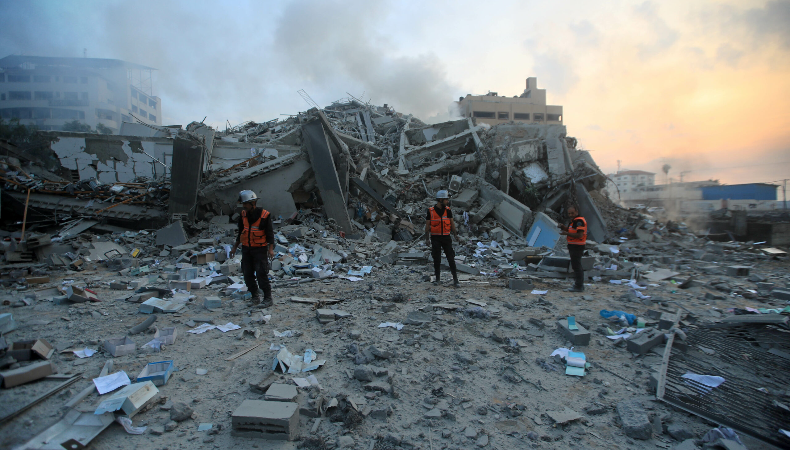
The 400th day of conflict in Gaza has left a tragic mark, with a recent airstrike claiming the lives of 36 civilians, including 15 children. As violence continues to escalate, this incident painfully underscores the devastating impact on civilians, especially innocent children caught in the crossfire. Gaza's people are no strangers to conflict, but each strike deepens the scars of this prolonged crisis, raising urgent questions about the path forward and the cost of continued violence.
A Day Marked by Tragedy
On this somber day, a densely populated neighborhood in Gaza was hit by an airstrike that caused catastrophic destruction. Civilians in the area, many of whom are unable to escape due to ongoing blockades and limited resources, were left to face the unimaginable. As the dust settled, rescue workers and residents scrambled to pull survivors from the debris, facing heartbreaking scenes of loss. For many families, the 400th day of conflict marked a day of devastating personal tragedy as they lost loved ones and neighbors.
The strike serves as a painful reminder that Gaza's civilian population bears the brunt of this conflict, enduring loss after loss while struggling to find safety in a place where no area feels truly safe. Homes, schools, and hospitals are all potential targets, leaving residents with few options for refuge.
The Innocent Victims: 15 Children Among the Lost
This airstrike took the lives of 15 children, young lives full of potential that have now been cruelly extinguished. For Gaza's children, life under conflict is all they’ve ever known, with many experiencing the trauma of violence from a young age. While adults are forced to grapple with daily survival, the younger generation faces psychological wounds that may never heal. Beyond immediate trauma, the absence of stability, safety, and a future to look forward to leaves Gaza’s youth caught in a cycle of fear and despair.
The tragic loss of these children sends ripples of grief across Gaza. The community mourns collectively, knowing that the pain is not isolated but shared by families and friends throughout the region. It serves as a haunting reminder of how war devastates families and crushes the dreams of the most vulnerable.
Global Reaction: Renewed Calls for Peace Amid Rising Tensions
As news of the attack spread, leaders and human rights advocates worldwide voiced their concerns, calling for an immediate ceasefire to prevent further loss of innocent lives. International organizations have renewed calls for a path toward peace, one that prioritizes civilian safety and ensures humanitarian aid reaches those in need. Some countries have advocated for de-escalation, stressing the urgent need for diplomatic engagement to halt the relentless bloodshed. However, the divided response from the international community reveals the complexity and polarization surrounding this conflict, with some actors advocating for military engagement and others pushing for peace talks.
The 400th day of conflict marks an inflection point, with global leaders facing a critical decision: to act decisively in pursuit of peace or continue down a path that only breeds more violence and suffering.
A Humanitarian Crisis Amid Uncertainty
The prolonged conflict has placed immense strain on humanitarian efforts. Organizations struggle to provide essential aid, from medical supplies to food and shelter, due to access restrictions and resource shortages. Civilians in Gaza, many of whom live in extreme poverty, are left in desperate conditions, with children and the elderly particularly vulnerable. Every day, families worry about accessing basic necessities, wondering if they’ll have food, clean water, or even a roof over their heads by nightfall.
The ongoing violence not only destroys infrastructure but also erodes the hope and resilience of those trying to survive. Humanitarian workers, facing numerous obstacles, press forward despite the high risks involved, knowing that their work is a lifeline for many.
The Path Forward: Seeking a Lasting Solution
This tragic day in Gaza’s conflict history highlights the need for a sustainable solution. As violence continues, innocent lives are lost, families are shattered, and a community’s resilience is tested time and again. Without meaningful diplomatic efforts, the region remains locked in a tragic cycle of violence, with each strike deepening the humanitarian crisis and diminishing hopes for a brighter future.
Gaza’s people deserve peace—a future where children can go to school safely, where families can rebuild without fear of losing loved ones overnight, and where communities can heal from years of trauma. It’s up to the international community to push for diplomatic action that not only addresses the immediate ceasefire needs but also tackles the root causes of this ongoing conflict.
For now, as Gaza mourns yet another heartbreaking loss, the world stands witness to a devastating humanitarian crisis that demands urgent action. Without immediate intervention and a genuine commitment to peace, the cycle of violence is likely to continue, with even more lives caught in its tragic path.
